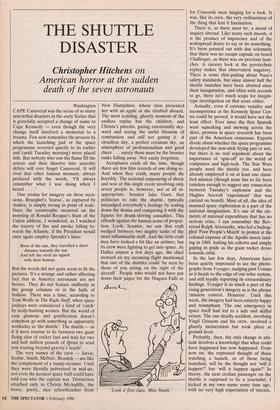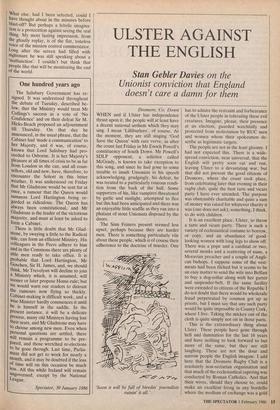THE SHUTTLE DISASTER
Christopher Hitchens on
American horror at the sudden death of the seven astronauts
Washington CAPE Canaveral was the scene of so many non-lethal disasters in the early Sixties that it gratefully accepted a change of name to Cape Kennedy — even though the very change itself involved a memorial to a trauma. Few now remember the process by which the launching pad of the space programme reverted quietly to its earlier and (until Tuesday morning) more placid title. But nobody who saw the flame fill the screen and then dissolve into anarchic debris will ever forget Canaveral. It will rival that other famous moment, always prefaced with the words, 'I'll always remember what I was doing when I heard . . .
One strains for imagery on these occa- sions. Brueghel's 'Icarus', as captured by Auden, is simply wrong in point of scale. Since the catastrophe occurred on the morning of Ronald Reagan's State of the Union address, I wondered, as I watched the tracery of fire and smoke falling to- wards the Atlantic, if the President would once again employ Spender's lines:
Born of the sun, they travelled a short distance towards the sun And left the vivid air signed with their honour.
But the words did not quite seem to fit the pictures. It's a strange and rather affecting fact that in America astronauts are not heroes. They do not feature endlessly in the gossip columns or in the halls of fashion. There was a time, according to Tom Wolfe in The Right Stuff, when space jockeys were considered a kind of 'catch' by scalp-hunting women. But the world of easy glamour and gratification doesn't somehow go with something as apparently workaday as 'the shuttle'. The shuttle — as if it were routine to lie between two giant flying silos of rocket fuel and wait for two and half million pounds of thrust to send you roaring beyond gravity's reach!
The very names of the crew — Jarvis, Scobie, Smith, McNair, Reznick — are like the complement of a tramp steamer. Until they were literally pulverised in mid-air, not even the keenest space buff could have told you who the captain was. Distinction attached only to Christa McAuliffe, the brave, pretty, nice schoolteacher from New Hampshire, whose class presented her with an apple as she climbed aboard. The most scalding, ghastly moment of the endless replay has the children, and Christa's parents, gazing emotionally sky- ward and seeing the awful blossom of combustion and still not getting it. A cloudless day, a perfect cerulean sky, an atmosphere of professionalism and good cheer . . . surely those must be the booster tanks falling away. Not easily forgotten.
Aeroplanes crash all the time, though there are few film records of one doing so. And when they crash, many people die horribly. The national outpouring of shock and woe at this single event involving only seven people is, however, not at all in- appropriate. Senator Jake Garn, first politician to ride the shuttle, typically misjudged everybody's feelings by scaling down the drama and comparing it with the figures for drunk-driving casualties. This offends against the human sense of propor- tion. Look, Senator, we saw that craft wedged between two mighty tanks of the most inflammable stuff. And the little craft may have looked a bit like an airliner, but its crew were fighting to get into space. At Dulles airport a few days ago, the chief steward on my incoming flight mentioned that one of the shuttles could 'be seen by those of you sitting on the right of the aircraft'. People who would not have put down their paper for the Niagara Falls or 'Leak it first class, Miss Smith.' for Concorde were lunging for a look. It was, like its crew, the very ordinariness of the thing that lent it fascination.
There is, as there must be, a mood of inquiry abroad. Like many such moods, it is the product of impotence and of the widespread desire to say or do something. It's been pointed out with due solemnity that there was no escape capsule on board Challenger, as there was on previous laun- ches. A cursory look at the pyrotechnic replay makes that observation nugatory. There is some chin-pulling about Nasa's safety standards, but since almost half the shuttle launches have been aborted since their inauguration, and often with seconds to go, there isn't much scope for Insight- type investigation on that score either.
Actually, even if extreme venality and incompetence at the Kennedy Space Cen- tre could be proved, it would have not the least effect. Ever since the first Sputnik went squeaking and mewing across the skies, prowess in space research has been part of the American consensus. Experts divide about whether the space programme developed the non-stick frying pan or not, but there is no real argument about the importance of 'spin-off to the world of computers and high-tech. The Star Wars people need the shuttle too, and have already employed it on at least one classi- fied mission (though none has so far been tasteless enough to suggest any connection between Tuesday's explosion and the Hughes Aircraft 'experiment' that was carried on board). Most of all, the idea of manned space exploration is a part of the national imagination. It's one of the ele- ments of national expenditure that has no serious critic. I can remember the Rev-. erend Ralph Abernathy, who led a bedrag- gled 'Poor People's March' to protest at the colossal expense of the Apollo moon land- ing in 1969, halting his cohorts and simply gaping in pride as the giant rocket drove towards orbit.
In the last few days, Americans have been quietly impressed to see the photo- graphs from Voyager, nudging past Uranus as it heads to the edge of our solar system, and still loyally reporting its extraordinary findings. Voyager is as much a part of the rising generation's imagery as is the phrase `mission control, Houston'. Until this week, the imagery had been entirely happy and triumphant. The one emergency in space itself had led to a safe and skilful return. The one deadly accident, involving Virgil Grissom and his crew, involved a ghastly incineration but took place at ground level.
Probably, then, the only change in atti- tude involves a knowledge that what could have happened has now happened. From now on, the repressed thought of those watching a launch, or of those being launched, will be the thought not 'will it happen?' but 'will it happen again?' In theory, the next civilian passenger on the shuttle is supposed to be a journalist. I kicked in my own name some time ago, with no very high expectation of success. What else, had I been selected, could I have thought about in the minutes before blast-off? But perhaps a febrile imagina- tion is a protecxtion against seeing the real thing. My most lasting impression, from the ghastly replay, is of the flat, toneless voice of the mission control commentator. Long after the screen had filled with nightmare he was still speaking about a `malfunction'. I couldn't but think that people like that will be monitoring the end of the world.















































 Previous page
Previous page